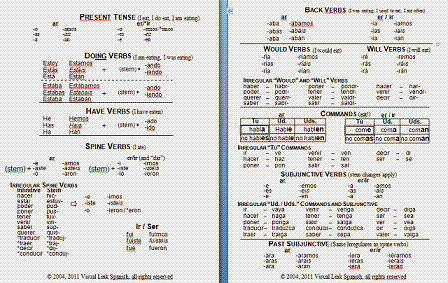Spanish Question:
Dave, thanks for your explaination on the “a” before some verbs… Now I remember from level 1 that after some verbs you had the “a” in parentheses after some verbs. I also purchased the 501 verb book that you suggested. I think it will help, especially when I get used to the terminology used in the book.
Comment:
As you mention, there are certain verbs from Level I that you have to put an “a” afterward if you add another verb on after (you have to memorize these):
Quiero aprender a leer. (I want to learn to read.)
Necesito enseñarle a tocar el instrumento. (I need to teach her to play the instrument.)
Question:
As I said in my last email, I have started level 3 now. I have been in the program for a year and a half now and in some respects feel like I am progressing pretty well but in others feel like I am lagging a little. Just have trouble with the irregulars in as far as getting them mixed up. I keep going back through them to try to get them straight. Is this pretty common? I learn them fine while in a lesson but as I go on I get confused on which verbs for which tense.
Answer:
This is very common. The most challenging part about Spanish is learning the verbs because there are so many tenses and conjugations. The good news is that the more you practice (with the software and with native speakers), the better you get. Keep plugging away and eventually it will come. To really become fluent, I recommend 30-60 minutes a day 3-5 days a week. Remember, cramming doesn’t work. You learn it and then forget it soon thereafter.
Question:
Another concern I have is how slow I am to comprehend when others are speaking. I can read and write pretty well, speak pretty well if I think first but comprehension is my weak point. I am thinking of the DLC product but don’t want to overload. I still have to finish level 3 and I have the additonal verb product that I haven’t even looked at yet. Just wondering what your thoughts on this are. I should probably mention that I am 58 yrs old and that might hinder the speed of my progress some. I would appreciate any advice you might have. I am hooked and want to become fluent. By the way, what is considered fluent? Thanks—————Rick
Answer:
For what you want, I would really recommend the Spanish Comprehension Trainer and not the DLC at this point. It has real-life conversations between native speakers and it helps you to understand them with a translation tool. There is also a tool to let you hear everything slower. As you use this software, you will start to recognize the verb tenses you are learning and how they are used.
To answer your question about becoming fluent, fluency really means a lot of different things to a lot of different people. remember to just keep practicing – eventually you reach breakthroughs that are exciting and that confirm your progress.
Question (from a different anonymous Spanish learner):
I don’t know what I ought to do. No sé lo que debo hacer. Why the direct object lo?
Answer:
Here the “lo que” means “that which”. So, the translation would be, “I don’t know that which I ought to do”.
Question:
I’m going to ask my aunt what she thinks. Voy a preguntarle a mi tía lo que piensa. Why the direct object lo? I can’t figure this out.
Answer:
Again, here you are literally saying, “I am going to ask my aunt that which she thinks.” I realize that sounds a little different from the way we would actually say it in English, however, that’s how they say it in Spanish.
Hopefully that answers your questions.
If any of you readers has future question, please comment here on our blog.
¡Hasta luego amigos!









